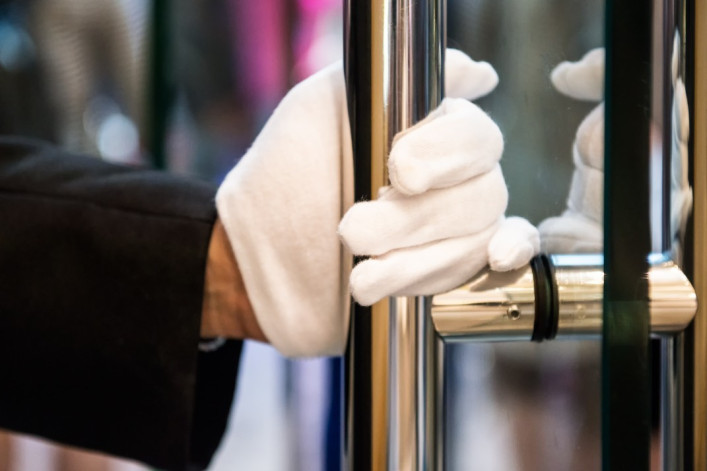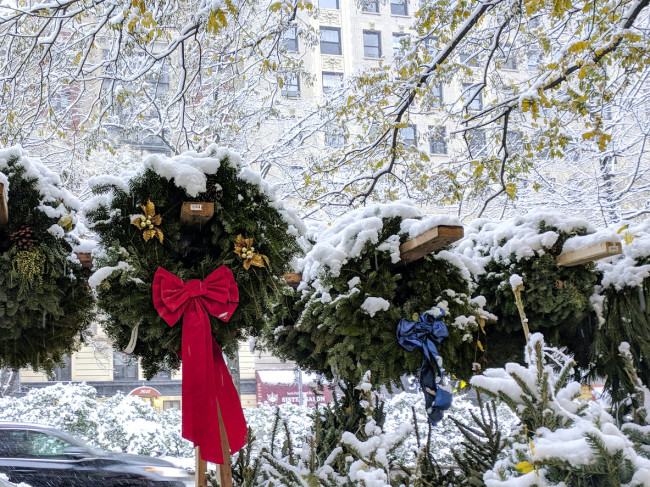What happens to bad tippers in NYC apartment buildings

Faced with confusion over tipping, some New Yorkers may end up tipping in a way that's judged insufficient by building staff, while others opt out of the tradition entirely.
iStock
Holiday tipping is a fraught subject for many New Yorkers who live in buildings with staff, raising thorny questions of who to tip, how much, and when. It doesn't help that the situation in each building can vary: Some do tipping pools; others might encourage alternatives to cash; still others may have staff whose service residents are unhappy with and would rather not reward at all.
Faced with this confusion, some may end up tipping in a way that's judged insufficient by staff, while others opt out of the tradition entirely. We spoke to staff and residents of a range of New York buildings and found that when it comes to doling out below-market gratuities to the building staff, there seem to be three kinds of apartment dwellers: Those forced by circumstance, those who under-tip by design, and those who do it out of ignorance.
[Editor's note: A previous version of the post was published in November 2017. We are presenting it again in case you missed it.]
One white-glove building staffer told us that she has received tips ranging from $5 to $100, and is satisfied with any amount.
"I've talked to my coworkers, and the most important thing for us is how we feel about the job we're doing," she says. And at the end of the day, "You have to obey everybody, whether they tip you or not. You have to open the door whether or not they say good morning. They are the owners."
That said, in some instances, there could be consequences to a failure of generosity at holiday time, depending on the circumstances.
Frugal by circumstance
Who: Under- or unemployed as well as retired residents on fixed incomes.
Consequences: Though some staff say they won’t perform extra work for free inside these residents’ apartments, most say they don’t treat this group any differently from regular tippers. In fact, many doormen we spoke to say if they receive a low tip—particularly from someone who normally tips fine—they automatically attribute it to financial trouble and that there is no need to say “wish I could do more.”
"From my point of view," one Queens super says, "I appreciate whatever the residents give me, because it is not an obligation for people to give a tip. Any show of appreciation means that they remember what we do for them."
Example: One renter recalls living in a building with a staff of 20 people while he was a graduate student on a tight budget. With no tip pool to contribute to, he knew he couldn't afford to tip every staff member individually.
"So I baked them cookies," he says. "They seemed to take it well! They were always really nice to me."
Intentionally cheap
Who: This group of under-tippers includes residents who are frugal by choice rather than circumstance; those who regard holiday tipping as a form of extortion; those who reward bad service with bad tips; and short-term tenants or subletters who assume tipping is the owner’s responsibility, or who don’t plan on living there long enough to reap the benefits of a decent tip.
Consequences: Some staff maintain that they extend the same degree of service to good tippers and bad tippers alike: “What can you do, not open the door for them?” the doorman of a large, post-war co-op on lower Fifth Avenue asks. “It just has to be the same.”
Others say that since tipping isn't mandatory, any tip—no matter how small—is better than nothing.
"The way I look at is, no one technically has to tip, and I'm grateful for every tip I get, but admittedly not every doorman thinks like me," a doorman for an Upper East Side co-op says. "A young guy or girl whose parents bought the apartment for them, or a widowed senior citizen who seems to live by themselves on modest means, you'd understand if the tip is lower than average (although the latter are often actually the best tippers). A couple where one's a lawyer, one's a doctor, they own a duplex and they tip 20 bucks would rub a lot of doormen the wrong way."
He adds that the expectation for those kinds of residents is a tip of at least $100.
Some staff do admit to changing their behavior after receiving a low tip.
“You don’t exile or excommunicate them,” the doorman of a 60-unit Upper West Side prewar co-op tells us. “It’s just more of an attitude that changes.”
That means fewer smiles at the door. It can also translate into fewer favors like bending delivery rules, putting up a shelf, walking your dog, or unlocking your door without charging a lockout fee.
(Note: If you hand out a low tip to a low-performing staff member, assume that he or she will find out how their tip compares to the others you dole out. Especially in smaller buildings, staff gossip about who gives what.)
Example: An Upper East Side co-op owner in a building with 20-employees plans to cut his super's tip in half (to $50) because the super hasn't been responsive to complaints about inconsistent hot water.
He is not worried about the consequences for two reasons: "To be honest, our super is old and on the way out soon." Also, he says, "The porters in the back and the handymen get everything done. I go to them primarily."
He plans to bump up tips to employees lower on the totem pole this year, to about $50 each. But the elevator man will get the most, $100, because the man sees him the most, and because the elevator operator is a fellow Red Sox fan.
Blithely unaware
Who: Newer, younger residents who don’t have a clue, and much older residents whose tips haven’t gone up much since the Nixon era.
Consequences: Frequently, less service for the first group, but it probably won't bother them since they won’t know what they are missing anyway. For the second demographic, consequences can range anywhere from business as usual to a pay-as-you-go approach toward extra work or favors.
Example: Newly separated from her husband a few years ago and spending her first holiday alone, one apartment dweller was in the dark about how much to give the 19 staff members in her Upper West Side building, many of whom had helped her move in. She wound up giving some back-of-the-house staff $10, while the super got $50. Service was "poor" afterward, and after asking around in the following weeks, she learned she should have given more.
"I had a feeling of inadequacy," she says. She bumped up her tips the next two years before moving out (the super received $100) but it didn't seem to make much of a difference. Whether she had gotten off on the wrong foot or the staff underperformed for everyone, she never knew.
Another young New Yorker was new to the city and unfamiliar with the tradition of tipping, so she gave holiday gifts to her building's staff.
"I always thought I was being awesome by giving a bottle of wine or box of chocolates, and then another tenant scolded me," she says. Her neighbor told her that the staff was paid poorly and tips from residents made a big difference for them.
After that, she says, "We started to give $50 to the regular guys we saw all the time, but there were others we didn't see as often that we just gave the chocolates to."
She didn't pick up on any retaliation for not tipping in the past, but says she continued to feel uncertain whether she was giving a fair amount.
"Honestly," she says, "I always felt like I was giving not enough or too much."
You Might Also Like



























